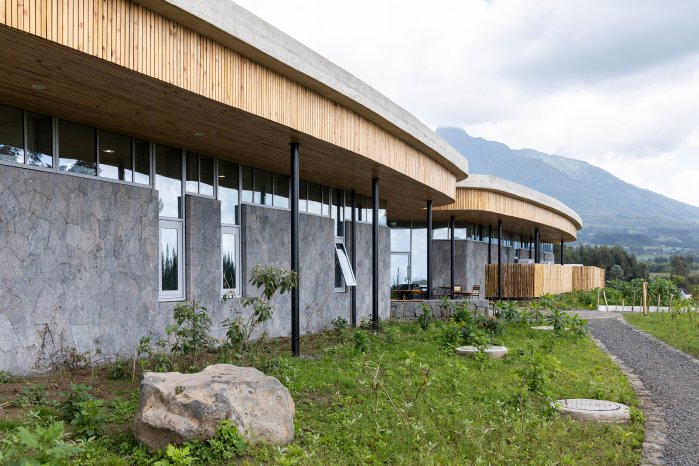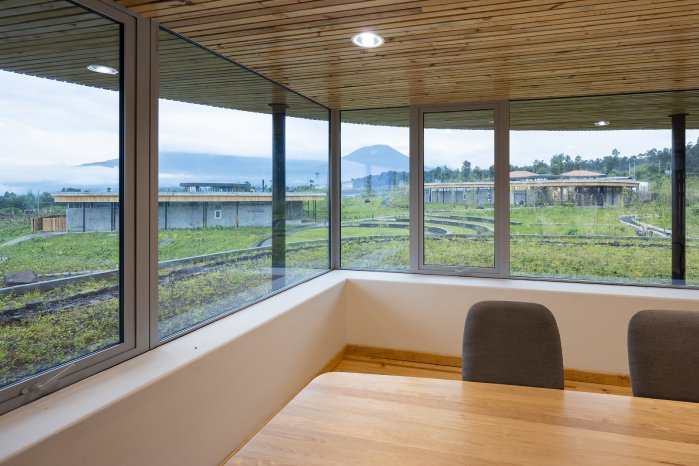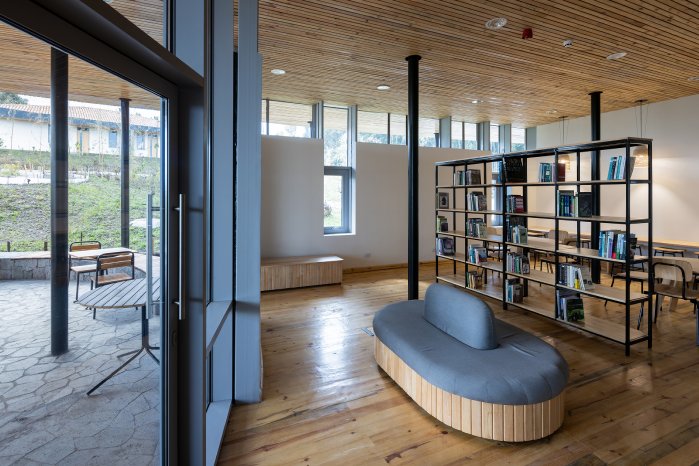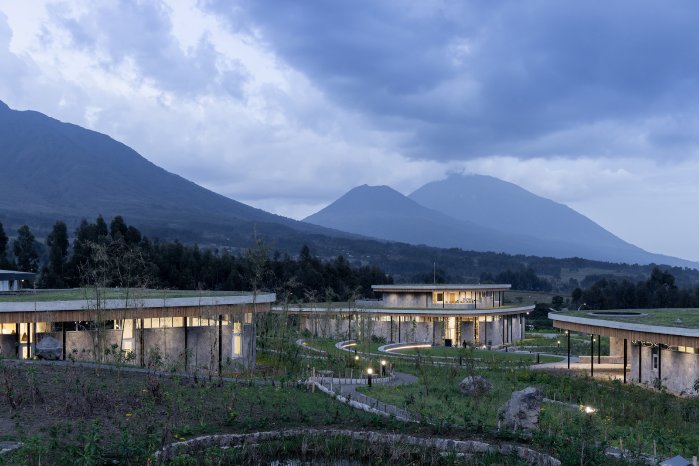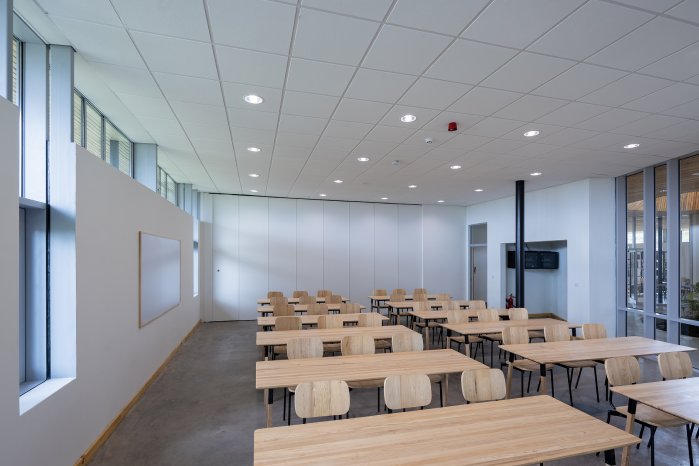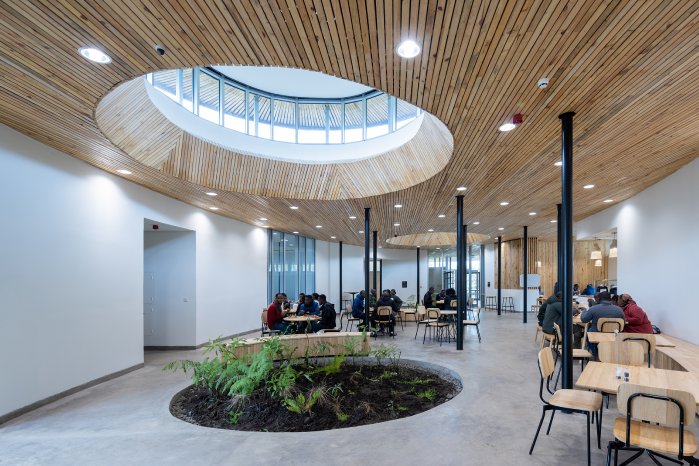Since opening in February 2022, not a week has passed without at least one school visit to the newly constructed Ellen DeGeneres Campus of the Dian Fossey Gorilla Fund. The site, which covers nearly five hectares of land, lies directly beside Volcanoes National Park, around 100 kilometres northwest of Rwanda's capital city Kigali. This area is known for its wild mountain gorillas. The unique campus offers an exciting experience for locals as well as tourists interested in conservation. It houses a 4500 m2 building complex which displays a range of exhibits and interactive experiences to provide fascinating glimpses into the world of the endangered apes. The influx of visitors to the campus is further increased by African scientists and students who have discovered the excellent working conditions there, enabling the next generation of pioneering gorilla researchers to emerge through its doors.
A country on the rise
While Rwanda always needs educated talent, the aim in future will be to bring economic growth and prosperity into harmony with the conservation of gorillas and nature through ecotourism. The number of "gentle giants", as the mountain gorillas are lovingly known, has more than doubled since the mid-1980s, from 250 to around 600 gorillas in the Virunga mountains – with another 400 in Uganda’s Bwindi forest. However, their natural habitat is shrinking, and further initiatives are needed to prevent conflicts between different mountain gorilla groups and between them and the growing local population. Ecotourism is an important economic sector for Rwanda and brought in almost 500 million US dollars for the east-African country in 2019. Rwanda is also one of the few African countries to have largely reached the Millennium Development Goals set by the United Nations and to have taken a leading role in implementing Agenda 2030 and the Paris Agreement. Plastic bags have been banned in Rwanda since 2006, while waste sorting has been in progress in Kigali since 2009. A solution also seems to have been found to the problem of forest clearing for oven firewood in conservation areas. Efficient ovens reduce the need for oven firewood by up to 80%, improving the daily lives of the people and saving them money for other necessities such as food and education. With regard to the population, 40% of Rwanda's citizens are under 15 years old. Creating jobs and prospects for young people is not only important for alleviating poverty, but is also vital for ensuring social peace, security and stability in the country. The Ellen DeGeneres Campus of the Dian Fossey Gorilla Fund is therefore opening in the right place at the right time. It provides people in the region with easy access to conservation issues. The site also acts as a driving force to encourage young people in particular to help protect mountain gorillas and the fragile ecosystem in which they live.
Architecture with a positive impact
The visionary architecture and design of the building complex was conceptualised by MASS Design Group, who have been credited with multiple awards for their context-based approach to construction. The network recently received the Architecture Firm Award, given by the American Institute of Architects every year to exceptional architectural practices based in the U.S. The mission of MASS (which stands for Model of Architecture Serving Society) is to create buildings which promote humanity, fairness and healing. To achieve this goal, the community-oriented collective founded in 2008 considers social concerns and educational issues as well as ecological and economical aspects during planning. Around 250 architects, engineers, designers, scientists and artists belong to the Boston-based network, which works with governments and community organisations worldwide to have a positive impact on local people through architecture. Their current portfolio of around 80 projects includes the Clinton Global Initiative in Africa and the GHESKIO Global Health Alliance in Haiti, as well as schools, hospitals and cultural sites. In Rwanda, where one of the MASS branches is situated, the collective has already completed several projects, such as Kigali House, a centre for Rwandan start-ups founded by the Swedish Norrsken Foundation, and the Ruhehe Primary School of the M2 Foundation.
Helping people helps gorillas
MASS and the Dian Fossey Gorilla Fund began collaborating in 2015. Together, they set out to realise the organisation's vision of creating a larger facility in the Musanze district, as close as possible to the Volcanoes National Park, which would offer enough space for the various activities of the organisation. The Dian Fossey Gorilla Fund is the oldest and largest organisation for the protection of mountain gorillas worldwide. Their work combines conservation efforts and the study of individual animals with people-oriented programmes which aim to train local conservationists and improve the livelihoods of those who live near mountain gorillas. First, a comprehensive design concept was developed which considered the desires of the organisation as well as the complex conditions of the site. Experts from Minneapolis-based company TEN x TEN joined the team to work on the landscape design, while engineers from Transsolar developed the environmental solutions. The aim was to create a resource-conserving building complex with areas for presenting the life work of legendary US gorilla researcher and founder of the organisation Dian Fossey, as well as a research and education centre. The site also needed to be an attraction for ecotourists.
A campus for researching, teaching and learning
A generous lead gift from the Ellen Fund, an organisation founded by US comedian and actress Ellen DeGeneres for the protection of endangered animals, enabled the plan to be realised on a plot of former agricultural land with a view of the Virunga mountains. There is a building for each of the three key areas of researching, teaching and learning. The Cindy Broder Conservation Gallery features an exhibition with previously unseen artifacts about the work of Dian Fossey. The primatologist lived around the area in a tent and small cabins for almost two decades, studying the behaviour of mountain gorillas up close. The connection between active gorilla protection and nature conservation is explained here too. The gallery also includes meeting and conference rooms and a café. A particular highlight is the viewing platform, which offers a 360° panoramic view for observing the gorillas as closely as possible. The Sandy and Harold Price Research Center houses a modern research centre for studying gorilla genetics, physiology and palaeontology, with laboratory capacity that can be increased five-fold. Each year, the foundation expects hundreds of researchers and students to come to conduct research and work, sometimes for long periods of time. There are also 30 rooms available in smaller, individual neighbouring buildings to accommodate them. The Rob and Melani Walton Education Center targets the educational needs of children and teenagers. Besides classrooms, there is a computer room and library for learning about mountain gorillas. Meanwhile, a tablet tour through the neighbouring botanical garden with over 250,000 regional plants allows learners deepen their knowledge of the local flora and fauna in a fun, engaging way.
Inspired by the landscape and local materials
A source of inspiration for the planners when approaching the architecture was the tent in which Dian Fossey first lived when she began to study mountain gorillas. Unobtrusiveness, to avoid disturbing the animals was just as important as practicality, to provide an environment appropriate for working. An oval shape, green roofs and the use of local materials such as volcanic rock on the façades allow the building, like Dian Fossey's tent, to gently blend into the rolling hills. A series of covered patios ensure flowing transitions into the buildings. Meanwhile, toplights and punched openings ensure maximum daylight floods into the buildings. The natural light is sufficient even for the exhibits in the Gallery, so there is little need for artificial lighting. This solution not only saves energy but also provides a free view of the 4500 m tall volcanic mountains from almost anywhere in the building. The use of sustainable pinewood on the ceilings is also forward-thinking. This timber, which grows locally, creates a pleasant room temperature and did not require lengthy transport to the site. The planners also took advantage of the thermochemical ability of volcanic rock to store warmth. The rock was made into large tiles and used as flooring in the interior rooms to act as under-floor heating and balance out the day and night-time temperatures. Ventilation is also carried out by means of natural methods via outward-opening top-hung windows, which allow fresh air into the rooms when needed, while roof overhangs provide sun shading and glare protection.
A façade design combining creativity and functionality in one
The tried-and-tested Schüco FWS 50 façade system was used by planners as a basis for the creative façade design and successful skylight construction. The aluminium mullion/transom façade with a face width of 50 mm offers maximum design freedom and high functionality. The quality and durability of the system was of key importance to the architects when making their selection, as these characteristics improve the value retention and sustainability of the system. Another decisive factor for them was the pre-fabricated system components, which allowed the units to be easily fabricated in the local area and installed quickly and simply.
Visually attractive and practical at the same time are the atriums, which are equipped with seating and invite people to linger. The skylight construction above the atriums protects against the weather and provides the atriums with daylight. The Schüco AWS 50.NI perforated windows integrated into the façade also allow plenty of natural light into the building, so that artificial light sources can be reduced to a minimum. The window system has Cradle to Cradle Silver certification, proving its optimum values with regard to the use of safe and healthy materials, water and energy consumption, recycling capability and social responsibility. The non-insulated Schüco ADS 50.NI aluminium door system was used for the partition walls and door constructions in the interior and exterior areas. Its stable structure allows even floor-to-ceiling units to be safely constructed. The door system offers an elegant interior design which can withstand high levels of daily use.
Rainwater system sets new standards
The rainwater system installed on the campus – the first of its kind in Rwanda – involves the rain that falls on the green roofs being harvested for toilet flushing. The waste water is then fed through a specially constructed wetland, which filters the water before releasing it to soak back into the ground. The system is gravity-fed and therefore requires little energy. The concept addresses a serious problem: during Rwanda's long rainy season between February and May, up to 40% of the annual rainfall falls in this region. Experts predict that this is a phenomenon which is likely to intensify in future due to climate change and cause more frequent flooding. The district of Musanze is already affected by landslides due to heavy rain, which often results in destroyed roads that are not passable for weeks.
Involvement fosters identification
The campus not only sets an example in terms of architecture and design; the integration of the local people in the construction process on site is also exemplary. In collaboration with the German Agency for International Cooperation and the Integrated Polytechnic Regional College Musanze, more than 2400 people – around 30% of whom are women – learnt a skilled profession through their practical involvement in the construction process. They developed skills in areas such as electrics, sanitation, steel and metal fabrication, carpentry and furniture making. They also acquired knowledge in installing green roofs and received training on environmental and health protection on construction sites. Over 1600 articles were fabricated locally and are just as high-quality and sustainable as the rest of the products installed. In this way, the Ellen DeGeneres Campus of the Dian Fossey Gorilla Fund is not only a gift to nature, but also a symbol to the local population to continue working in harmony with the environment.
